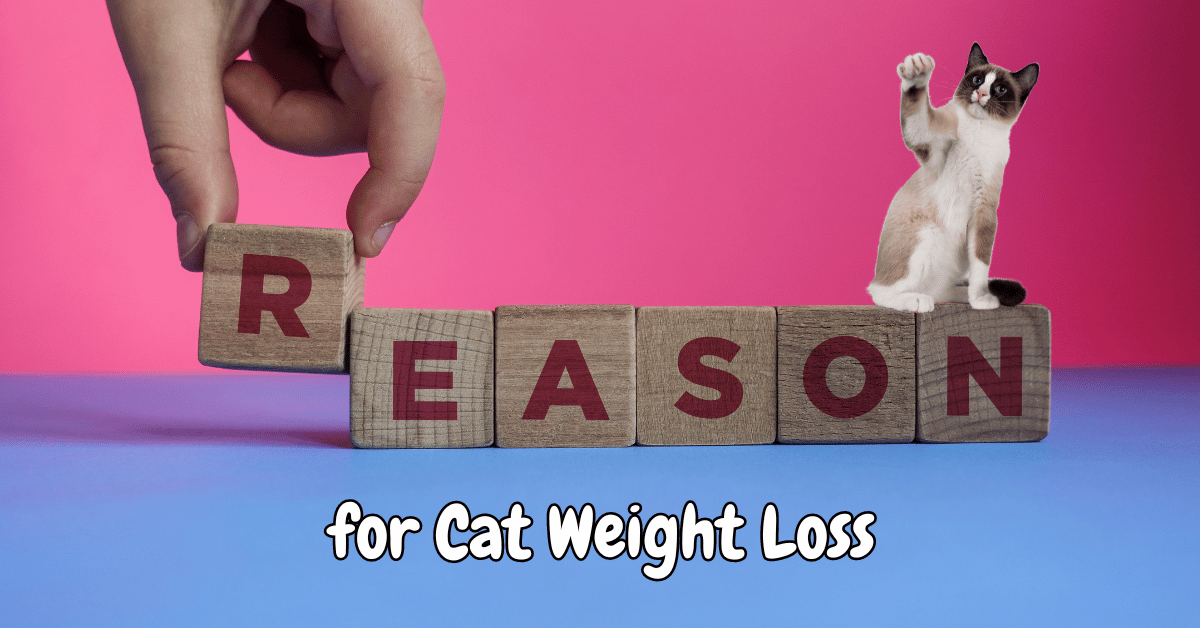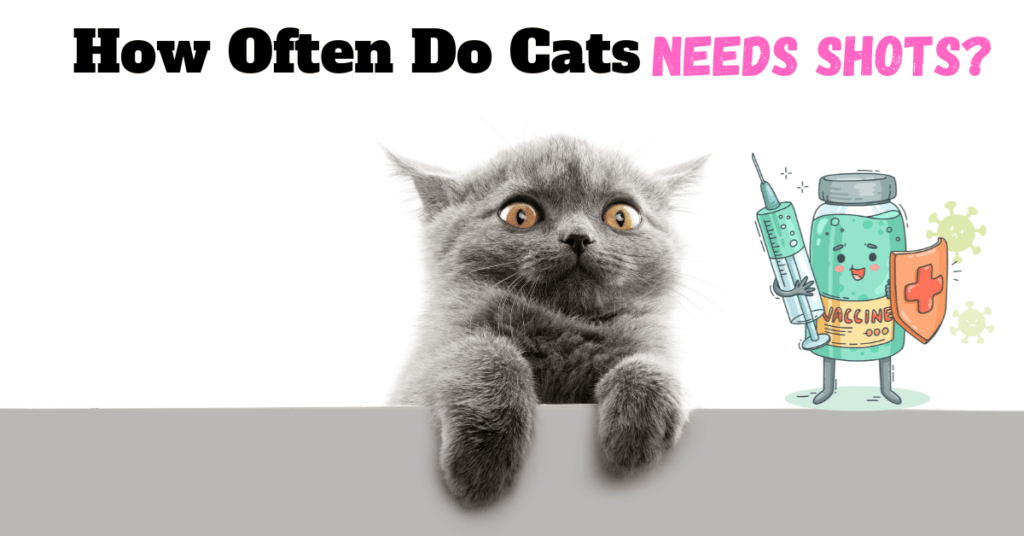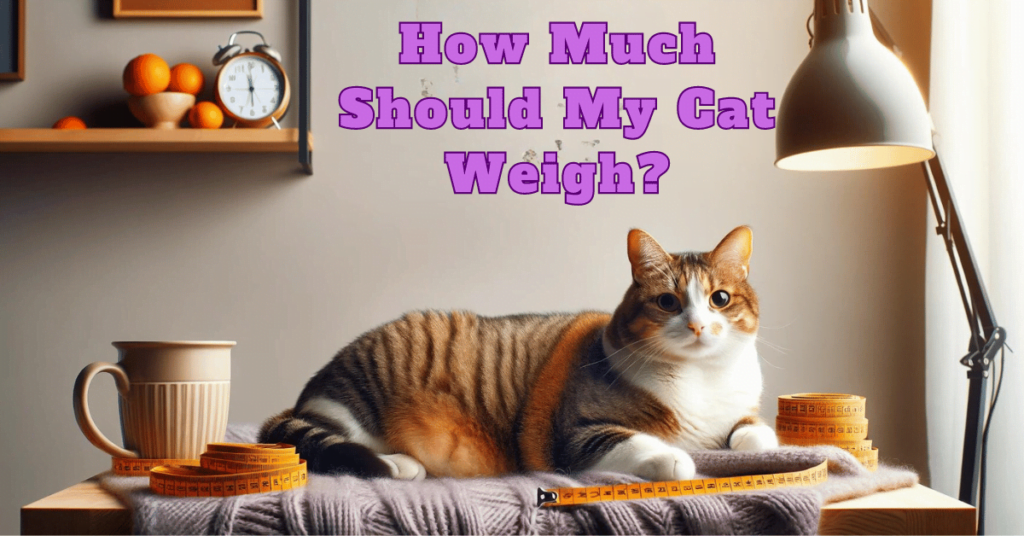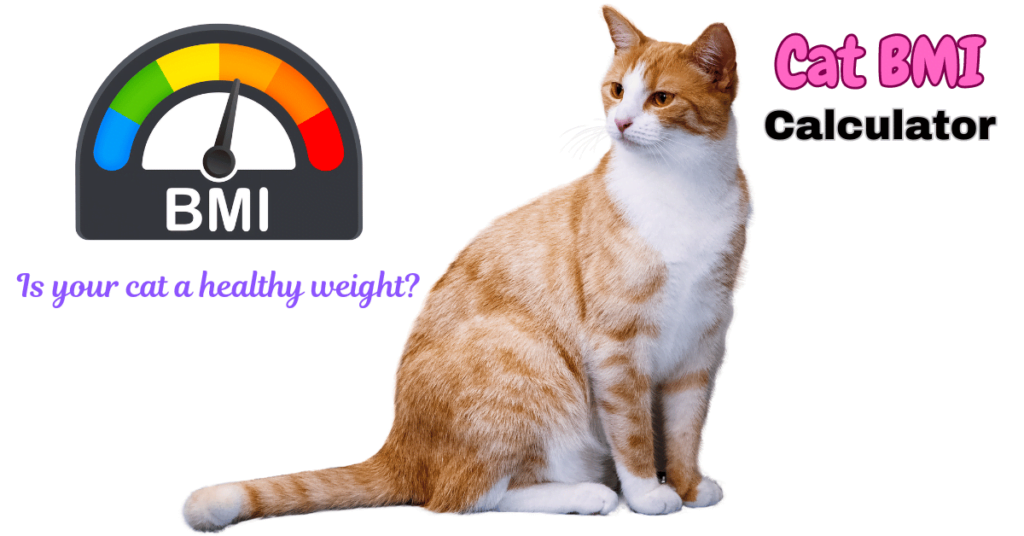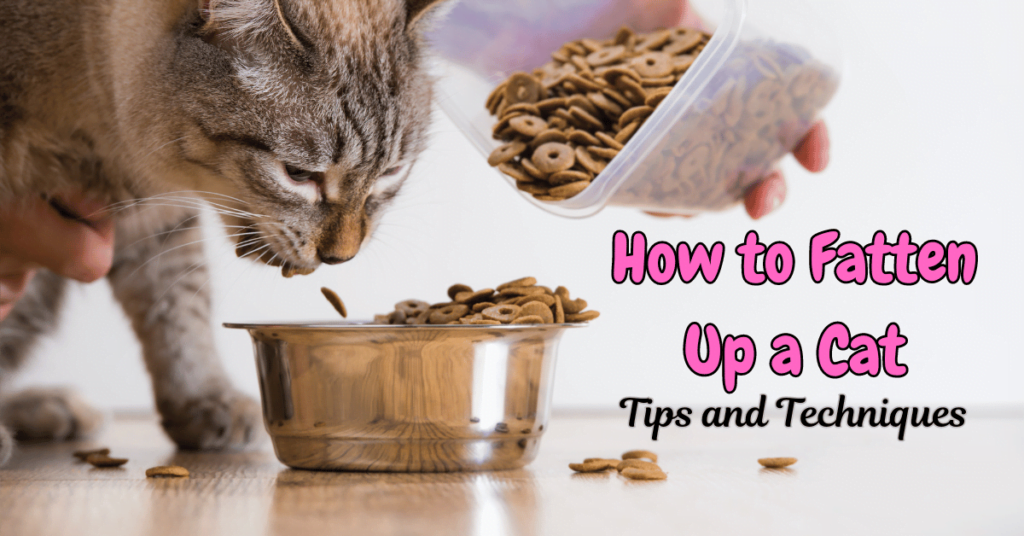This post contains affiliate links and I will be compensated if you make a purchase after clicking on my links.
Decoding Your Cat’s Weight Loss
Cats are the masters of disguise—not only at hide and seek but also when it comes to their health. Their wild instincts to hide any weakness are strong, meaning that noticeable weight loss could be a silent alarm for underlying health issues.
Whether it’s a simple fix like tweaking their diet or something that demands a bit more vet intervention, catching these changes early can make all the difference. So, if your whiskered friend is starting to look more svelte than usual without any diet plans on their New Year’s resolutions, it’s time for a little detective work
Pro Tip: Unintentional weight loss in cats can be tricky—it’s like a puzzle with many possible pieces. To figure out what’s causing your cat’s weight drop, a vet visit is non-negotiable.
Cat Losing Weight: 16 Factors You Need to Know
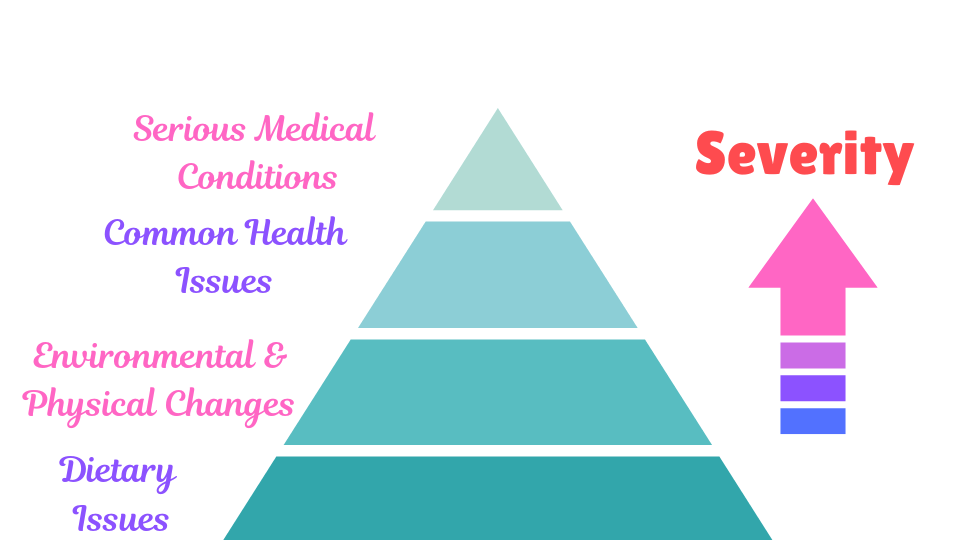
In this section, we’ll delve into the diverse array of factors that could be contributing to your cat’s weight loss, ranging from manageable dietary shifts to potentially serious medical conditions.
Dietary Changes & Issues
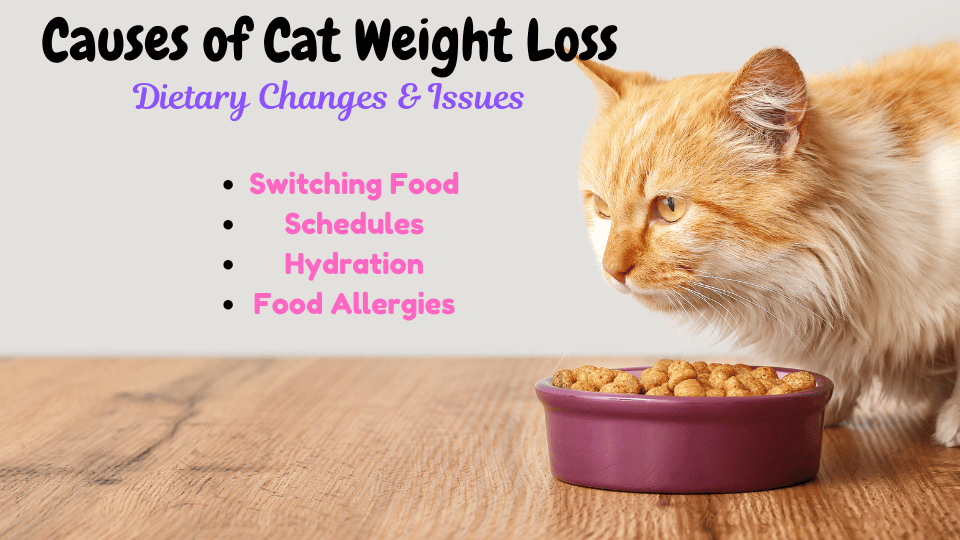
1. Switching Food Brands
A sudden switch in their food brand or type can be less than palatable for your picky eater. More than just turning up their nose at dinner, these new flavors or ingredients might not sit well on their delicate digestive systems either, leading to unintentional weight loss. If your cat is not quite feeling their new menu, it might be time to rethink those changes.
2. Feeding Schedules
Consistency is more than a virtue; it’s a necessity when feeding cats. They are creatures of habit, and nothing throws off their game like shifting their meal times. Irregular feeding can confuse their internal clock, resulting in skipped meals or a drop in appetite. Keeping a regular timetable not only keeps peace in your household but also keeps your cat’s tummy in check.
3. Hydration and Health
Never underestimate the power of water. Though often overlooked, water is essential to your cat’s diet, playing a crucial role in their overall health and weight. A lack of adequate water intake can quickly lead to dehydration, subtly affecting their health and potentially leading to weight loss.
4. Food Allergies
Food allergies can subtly undermine your cat’s health and contribute to weight loss. Symptoms like persistent scratching, skin lesions, and gastrointestinal issues, such as vomiting and diarrhea, often reduce a cat’s appetite and lead to weight loss. Common culprits include beef, lamb, seafood, corn, soy, dairy, and wheat gluten.
Pro Tip: If you suspect food allergies, transitioning your cat to a hypoallergenic diet with single-source proteins may alleviate symptoms and help stabilize their weight.
Environmental and Behavioral Influences
5. Stress and New Settings
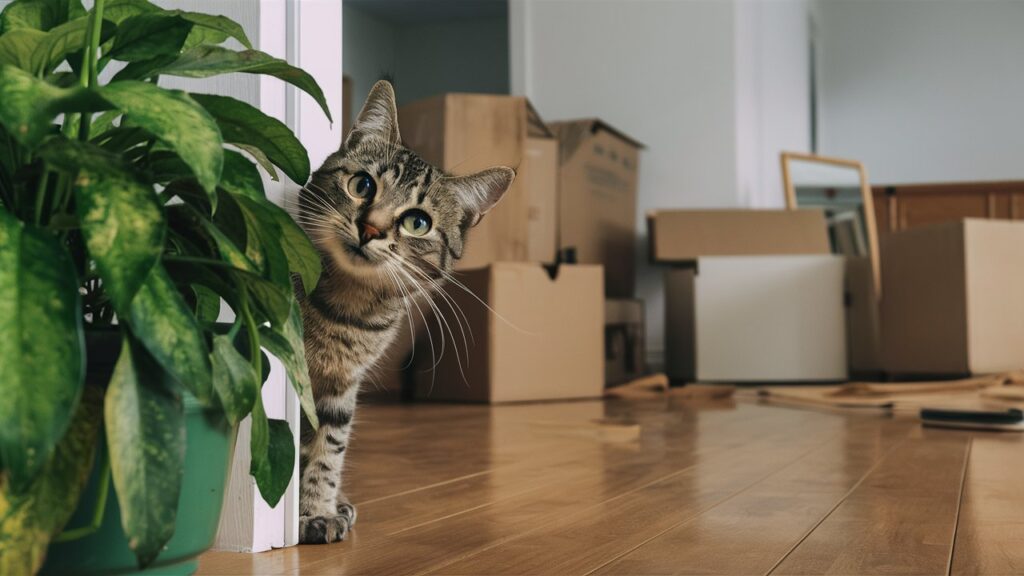
New pets, new people, or even a new home can unsettle your cat more than you might realize. Cats may not be social butterflies, but they do take note of changes in their environment, often reacting with reduced appetite. This stress, if sustained, can lead to noticeable weight loss. Ensuring a smooth transition during times of change can help mitigate these effects.
6. Routine Disruption
Cats love their routines as much as they love a warm spot on a sunny windowsill. Any disruption—whether it’s your new work schedule or rearranging the furniture—can send them into a tailspin. Anxiety over disrupted daily rituals can lead to a decrease in food interest, impacting their weight over time.
Physical and Age-Related Changes
7. Activity Level
Changes in your cat’s activity levels can significantly impact their metabolism and overall health. While increased activity typically leads to weight loss, it’s not impossible for them to lose weight due to a lack of exercise and loss of muscle. Maintaining a healthy metabolic rate is crucial, so keeping your cat engaged and active is essential.
8. Age-Related Factors
Age doesn’t just bring wisdom to your cat—it also brings changes to their body composition and metabolism. As cats grow older, they naturally lose muscle mass, and their metabolic rate slows down. These changes can lead to weight loss, even if your senior cat’s daily routine remains unchanged. Providing an age-appropriate diet and regular veterinary check-ups can help manage these age-related changes effectively.
Common Health Issues Affecting Weight
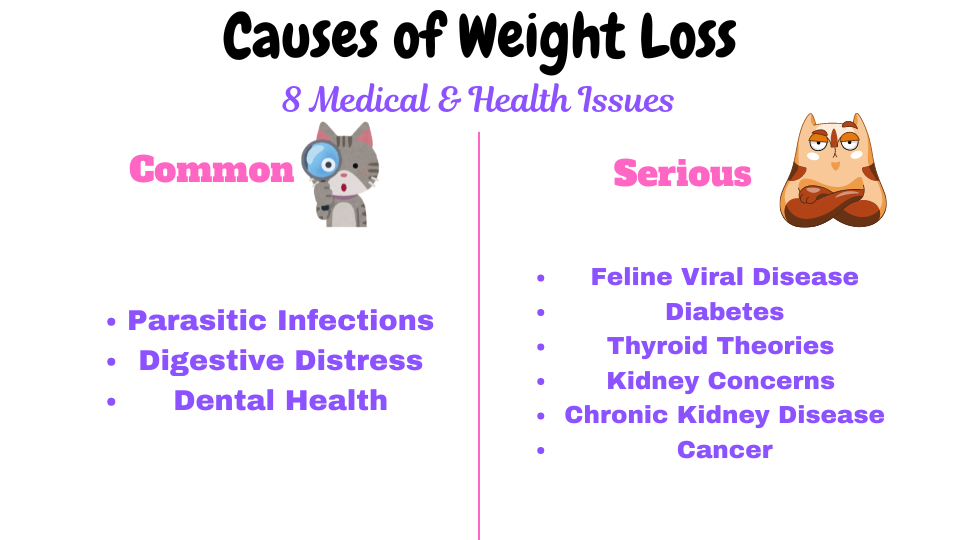
Health issues and other medical snags can lead to anorexia in your furry friend. True anorexia means your cat simply won’t eat, while pseudo-anorexia is when she wants to eat but can’t due to complications.
9. Parasitic Infections
It might not be something you can see, but parasitic infections are a serious stealthy assailant that can wreak havoc on your cat’s health. Parasites can severely impact the absorption of nutrients, leading to weight loss that might leave you puzzled if your cat seems to be eating well. Regular deworming and vet check-ups can help catch and treat these pesky parasites before they cause significant damage.
10. Digestive Distress
Just like humans, cats can suffer from conditions that upset their digestive systems. Inflammatory bowel disease (IBD) is one such condition that can disrupt your cat’s ability to digest and absorb nutrients effectively. This can lead to weight loss and can affect their overall health if not managed properly. A tailored diet and appropriate medication, guided by your veterinarian, can help manage this condition and improve your cat’s quality of life.
11. Dental Health
Unlike us, cats can’t just switch to the other side of their mouth when dental pain strikes, which can lead them to stop eating altogether. Dental issues such as mouth ulcers, gingivitis, tooth decay, and gum disease can make every bite a struggle. As eating becomes more painful, many cats reduce their food intake, inevitably leading to weight loss.
Pro Tip: To prevent these painful problems and keep your cat happily munching away, regular dental check-ups and maintaining good oral hygiene are crucial.
Serious Medical Conditions to Watch For
12. Feline Viral Disease
Feline Infectious Peritonitis (FIP), Feline Leukemia Virus (FeLV), and Feline Immunodeficiency Virus (FIV) are notorious troublemakers in the feline world. While these viruses vary in their mischief-making—from how they attack to how they’re treated—they share a common and troubling symptom: weight loss.
If your vet suspects that one of these viral villains is behind your cat’s sudden slim down, they’ll likely suggest some detective work in the form of tests. Identifying the exact virus is crucial because it steers the treatment plan.
13. Sugar Struggles: Diabetes
Diabetes isn’t just a human issue; it can affect our feline friends too. In cats, diabetes can lead to significant weight loss due to the body’s inability to properly utilize glucose. This metabolic misfire means that despite consuming calories, the body can’t convert them into energy effectively, causing weight to drop unexpectedly. Regular monitoring of your cat’s weight, alongside blood glucose tests, can help manage this condition before it becomes more severe.
14. Thyroid Theories: Hyperthyroidism
Hyperthyroidism is another culprit that can cause puzzling weight loss in cats. This condition leads to an overactive thyroid gland, ramping up metabolism to high speeds. Consequently, even if your cat seems to be eating more than usual, they continue to lose weight. Treatment can include medication, radioactive iodine therapy, or surgery, depending on the severity.
15. Kidney Concerns: Chronic Kidney Disease
Chronic kidney disease (CKD) is especially prevalent in older cats and can lead to gradual but significant weight loss. As the disease progresses, it can impair your cat’s ability to eat and process nutrients, leading to a decrease in appetite and weight. Managing CKD involves a combination of diet change, medication, and regular vet visits to slow its progression and improve quality of life.
16. Cancer’s Harsh Reality
Cancer can dramatically affect a cat’s health, including causing weight loss. The type of cancer, its location, and the stage it’s in can influence the treatment plan. Diagnosing cancer may require a series of tests such as blood work, urinalysis, X-rays, ultrasounds, and biopsies to understand the best approach to treatment.
Fact: Though we’ve listed the main culprits, weight loss can also result from liver problems, pancreatitis, and other conditions.
How to Tell if Your Cat Is Too Skinny?
While the scale can certainly tell tales, the ideal weight for the average healthy cat typically ranges from 8 to 12 pounds. But remember, cats come in all shapes and sizes, from the petite Siamese to the more robust Maine Coon.
Here’s how you can play detective to determine if your cat might be underweight:
- Body Condition Score (BCS): The Body Condition Score helps you assess whether your cat’s weight is healthy based on fat coverage and muscle mass, not just the numbers on a scale. A BCS looks at the shape and feel of your cat’s body, grading it on a scale from 1 (too thin) to 9 (obese). Ideally, your cat should be right around a 4 or 5, where you can feel their ribs but not see them.
- Weigh Regularly: Regular weigh-ins at home or during vet visits can help you track your cat’s weight over time, ensuring they stay within their ideal range. It’s essential to consider factors like breed, age, and sex when monitoring weight, as these can influence what constitutes a healthy weight for your feline friend.
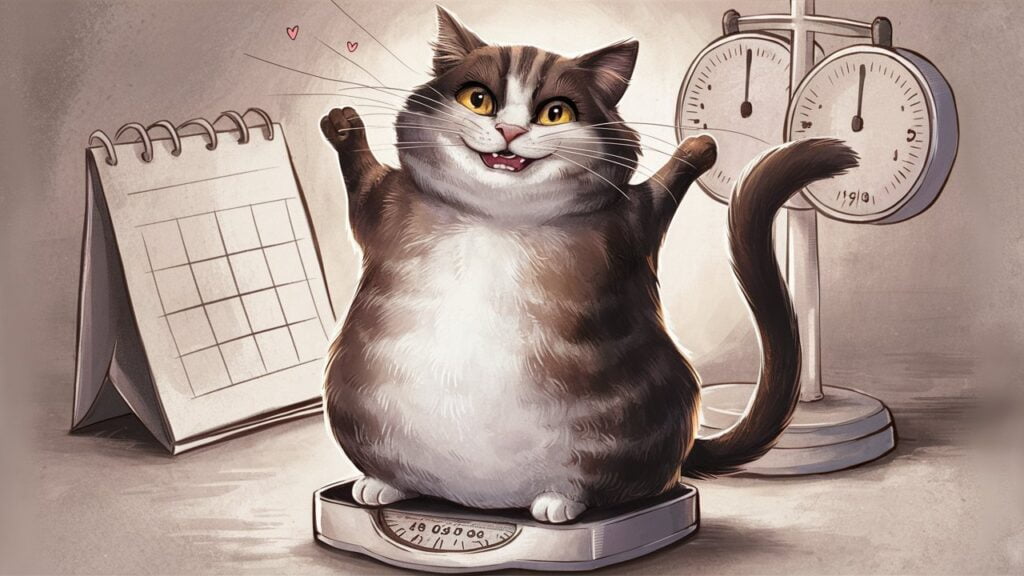
- Monitor Eating Habits: Changes in appetite can be subtle. If your cat is eating less than usual or leaving kibble behind, it might be time to investigate further.
- Check for Cat BMI: Feline Body Mass Index has been shown to be somewhat effective in evaluating whether your cat is at a healthy weight or might need some dietary adjustments.
Understanding the Signs: A Guide to Feline Weight Management
It’s vital to understand the numerous potential reasons why your cat might be losing weight. Whether your cat is facing normal aging changes, dealing with stress, or possibly exhibiting signs of a serious health condition, consulting with your veterinarian is crucial.
They can provide a thorough diagnosis and an appropriate treatment plan tailored to your cat’s specific needs. However, after you have determined the cause, it’s time to get them back on track in weight.

